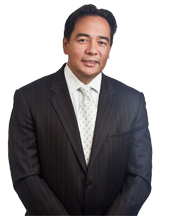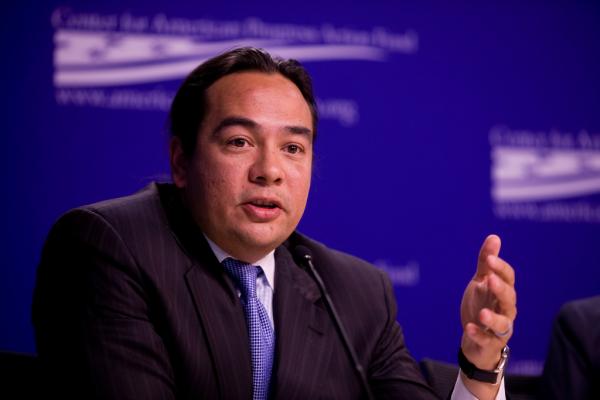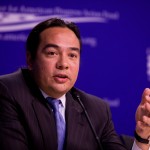Keith Harper, a Cherokee Nation citizen, was nominated by President Barack Obama to serve as the United State ambassador to the United Nations Human Rights Council and confirmed by the U.S. Senate on June 3, 2014. Harper is the first citizen of a federally recognized tribe to reach the rank of U.S. ambassador. He arrived in Geneva a week after his Senate appointment and has been on the job non-stop since then.
RELATED: Keith Harper, Cherokee Nation Citizen, Confirmed as Ambassador
Harper’s ambassadorship caps two decades of legal work on behalf of Native Americans, including a partnership at the law firm of Kilpatrick Townsend & Stockton LLP, where he was chair of the Native American Practice Group; senior staff attorney for the Native American Rights Fund; Supreme Court Justice on the Supreme Court of the Poarch Band of Creek Indians; and appellate justice on the Mashantucket Pequot Tribal Court.
ICTMN was pleased for the opportunity to conduct this interview. “This will be my first on-the-record interview since assuming my position so I wanted to be sure we did it with [a publication from] Indian country,” he said.
What is your mission as U.S. ambassador to the U.N. Human Rights Council?
I represent the United States at the council. The council is a 47 member-state body elected by the member states of the U.N. and its purpose is to promote human rights, plain and simple. It’s one of the three principal institutions of the United Nations so it plays a vital role in promoting human rights and we assert the positions of the United States vis-à-vis human rights. And the mission is that we have interests in assuring the expansion of freedoms – freedom of expression, freedom of assembly, among others. Certainly, the United States has important interests in assuring that countries live up to their obligations regarding human rights internationally, and there are a variety of mechanisms at the council’s disposal in order to shed a light on bad actors and bad situations and to otherwise establish best practices and provide technical assistance where needed.
What’s your typical day like when the council is in session?
Council sessions are very busy. They are chock-full of meetings where we’re negotiating texts on resolutions especially ones the United States cares deeply about. That would include things like freedom of expression, women’s rights, rights of Indigenous Peoples and country-specific resolutions where, for example, in the case of Syria you have mass atrocities going on for extended periods of time the United States took a leadership role in passing a resolution not only condemning the atrocities, but laying the groundwork for ultimate accountability for those committing such atrocities. So the council sessions are a busy time when we’re going through the process of finalizing documentation in order to pass very sound, effective resolutions and at the same time we’re making interventions, meaning we are identifying subject areas in which we have something important to say. … [I]n the June session we thought it was critically important to highlight the scourge of violence against Native women, indigenous women worldwide, that in far too many places, far too often and for far too long indigenous women have been subject to extraordinary violence and too often it goes unabated. So we thought it was important to highlight that situation and press states to find better ways to address those circumstances.
RELATED: US Ambassador Keith Harper: Violence against Indigenous Women ‘Global Scourge’
Can you actually affect policy? Do you have real tools to work with—a budget, a means to impose penalties or sanctions on violators?
Absolutely. I think it’s a demonstrable fact that the U.N. Human Rights Council’s actions have made a difference on the ground in a number of countries. … One, there is an ability to document through mandate-holders whether they be a special rapporteur or commissions of inquiry appointed by the council to go out and actually find the facts because what’s critically important here is not to debate the facts [but] to understand what the facts are and then one can understand what to do about the situation. And this leads to the ability to hold accountable not only states but also individuals within those states for violations of human rights. It’s also within the council’s power to provide technical assistance. What we find often is that states have a willingness to do better and bring themselves in line with their human rights obligations but don’t necessarily have the capacity to do so. So this technical assistance is critical to aiding them and enabling them to do better with human rights whether that be expanding freedom of expression, ensuring freedom of the press, making sure that there’s not extra-judicial killings – a whole variety of issues. So I think the council’s role is critical. The other piece that I don’t want to lose here is where the council acts on what we call thematic issues – things like insuring the protection of women, expanding the protection of children, taking steps against human trafficking, addressing concerns regarding Indigenous Peoples, having protections in place for LGBT persons. There’s a whole variety of thematic issues that we work on as well and these are a way to establish best practices, to appoint special rapporteurs to ensure that we are highlighting countries in which the practices are less than what they should be and also finding places where best practices have been established so that other countries can do the same.
Will you have any role regarding climate change policy especially as it pertains to working with tribes?
Climate change, as Secretary [of the State Department John] Kerry has stated time and time again is a critically important issue and it’s one that should be on the top of our priority list. The question is not whether or not the United States and the State Department should deal with climate change. The question really is, who should deal with it? What institutions are best equipped to affect real change on climate change? And there’s a number of bodies within the U.N. system and multilateral organizations generally that are affecting climate change in a very effective and forceful way. So from our vantage point, rather than try to force a square peg into a round hole, it’s better to have the institutions that are charged with dealing with climate change do so. And so the approach of the United States is to empower those institutions to bring together states so that we can deal with this critically important issue. And from my vantage point it should go without saying, the impact of climate change on Indigenous Peoples generally, and tribes in the United States specifically, ought to be a top agenda item for those addressing climate change.
How much of your work on the council will focus on Indigenous Peoples?
It’s obviously a priority issue for me. I think that now that we’ve had virtually universal acceptance of the [UN] Declaration on the Rights of Indigenous Peoples there is a roadmap and a set of principles which states should move towards and I think with respect to that document, but also just ensuring that basic human rights of all peoples, which applies to Indigenous Peoples as well and indigenous individuals, should be lived up to and there are a number of respects in which they’re not, around the world. We can do far better. The other piece on Indigenous Peoples that I think we’ve had a very positive development on in the United States over the last four decades is this movement towards empowering indigenous communities themselves to address the challenges they face. So, for example, in the Violence Against Women Act, that was a circumstance in which the President supported and ultimately signed a bill that provided criminal jurisdiction over non-Indians who commit violent crimes against women on the reservation. That is a watershed development because it empowers the tribe to deal with that challenge. And we think that’s a model that can be adopted in many other places where Indigenous Peoples are empowered either legally or through a provision of resources to address their economic, political or social challenges.
What, if any, will your role be in moving the federal government to implement the U.N. Declaration of the Rights of Indigenous Peoples?
Let me start by saying the United States from what I’ve seen of the internal dialogue regarding Indian policy has looked at the Declaration as a guiding source for implementing policy. I know that’s come up time and again in internal deliberations among federal officials and indeed if you look at some of the policies of the present administration whether it be the increased focus on consultation with tribes, insuring that there’s better economic development or empowerment of tribal governments or seeking protection of cultural resources – I think there’s a variety of ways in which the Declaration has informed policy already. My role is to encourage that and I will encourage that and have encouraged that… We think it should inform policy development everywhere and certainly in my experience it has already and should continue to inform policy development in the United States.
I think one of the things that made people uncomfortable was the language that was used when the federal government announced it was “lending its support” to the Declaration … and the State Department’s white paper said that the Declaration calls for “the development of a concept of self-determination for Indigenous Peoples that is different from the existing right of self-determination in international law.” Is there any evidence to support that claim?
Let me take each one of those questions separately. With respect to “lending support” I think it’s very clear from the President’s statement that he endorses the Declaration. You have to recall that the Declaration is indeed a declaration, meaning it’s not a legally binding instrument, it’s not covenant, and it’s not a treaty. Under international law, it declares certain principles by which we agree policy should be developed. And that’s very important! The Universal Declaration on Human Rights – when it was endorsed universally by states certainly the provisions were not universally complied with. Well, they’re still not universally complied with but I think there’s a push toward universal compliance with the Universal Declaration. So Declarations serve a critically important role but they are different from binding legal instruments. We just have to make that distinction, so when we say “lending support” or endorsing that’s an absolutely critical development. There was a thorough review of the Declaration. This president, who should be commended for it, decided to endorse the Declaration.
The second question goes to the issue of self-determination. I think there’s been an unfortunate tendency to get caught up in theoretical aspects of this… The scholars are pretty clear on one point – that self-determination has to be determined in a contextual manner based on the context in which it arises. So, for example, there may be in certain states, certain peoples who don’t have a right to secede because of concerns for territorial integrity and the important and vital central principle that is under international law. So self-determination is always to be viewed in a contextual manner and I think the thrust of that is to say that it should be viewed contextually here as well. But let’s really get down to the nitty-gritty here because what I think the Declaration says and the important message that it has is one that has been fully adopted by this President and that is that the relations between the United States and tribes should be nation-to-nation. He’s repeatedly said that and I think his actions and the actions of his administration have lived up to that ideal of being a nation-to-nation relationship where it’s not a top-down approach but far better to empower tribal communities to address the challenges that they face.
The U.S. has consistently said that the U.N. Declaration must remain consistent with existing U.S. Indian law but we know that’s not perfect. How can the Declaration be the basis for reforming what’s wrong with U.S. federal Indian law and policy when the U.S. insists that the Declaration must be interpreted in a manner that is consistent with existing U.S. federal Indian law and policy?
First thing I’d say is the Declaration, again, is a non-legally binding instrument; it’s a set of principles that states agreed to and that states’ policies should be guided by. And as I mentioned earlier, the Declaration has been and should continue to be considered as a guiding light. That is its critical importance. The second thing I’d say is we have vacillated over the last 200 years of Indian policy from times when there has been greater respect for tribal communities and tribal self-governance, whether that be during the IRA [Indian Reorganization Act] or now in the self-determination period since the late 1960s. But there have been other periods like allotment, termination where there were much more assimilation-oriented policies, much more disrespect for tribal self-government. What the Declaration does is say that we all agree that these are the principles and the principles include the principle that tribes should have a key role in their own destiny. And what that does is makes it much more difficult politically to have regression back to the more difficult policies that end up hurting tribes.
How do you respond to criticism that the U.S. has a less than stellar human rights ranking according to the United Nation’s own agencies and processes?
There’s no official rankings, I think that would be a misunderstanding. Look, the United States would be the first to admit that no state gets it right all the time. We all have our challenges. And that’s why we have treaty bodies like CERD [Committee on the Elimination of Racial Discrimination] and the Human Rights Council. That’s why the Human Rights Council has what’s called the Universal Periodic Review, meaning that every state goes under review on its human rights record because we believe that no state should be free from scrutiny and every state can do better on human rights. Having said that, I think we have to recognize that in so many ways the United States is the high water mark whether you’re looking at freedom of expression or freedom of assembly, or if you look at the movement that’s been made on securing the protections of LGBT people and the advancements in addressing standard discrimination, in preparing tribal communities to resolve their own challenges. There is no other state in the world that I’m aware of where Indigenous Peoples have been empowered to have criminal jurisdiction in their own court systems over non-members of that community, for example. So I think what we have to say is there are challenges, we need to continue these processes which are vitally important to holding up a mirror on every state so we can identify the challenges. And certainly no state is perfect and the United States has its challenges, but the important thing is that we have a robust and vibrant domestic dialogue to make sure we make progress day after day, month after month, year after year.
RELATED: The Shadow Knows: Begin Preparing Reports on US Racial Discrimination for UN Agency
RELATED: US Human Rights Record Challenged
How does your identity as an indigenous person inform your perspective on human rights?
Well, you know, given our history there’s no doubt there have been really tragic and difficult times. With the Cherokee Nation of course we have the Trail of Tears and even more recently than that when our lands were taken away and there were attempts to extinguish our tribal rights. I think what it does is it puts you in a place of having great empathy towards communities and individuals who are also striving to empower their own people… and to better connect with them in trying to resolve their human rights situations.
Could you please comment on the Washington football team’s use of the name Redskins?
On a personal level, I find the term “redskins” to be disparaging. I think it should have no place and if I owned the team I would change the name. It’s pretty clear cut to me – nobody would walk down the street and call me a redskin unless they were intentionally trying to insult me.
Once again, the United Nations has taken a strong stance in condemning what the Human Rights Council has described in its July 23 resolution as the “widespread, systematic and gross violations of international human rights” by Israeli forces in Gaza. (Among other things, the resolution included a provision to create an independent, international commission of inquiry to investigate all violations of international humanitarian law and international human rights law in the Occupied Palestinian Territory, including East Jerusalem, and particulary in the occupied Gaza Strip during the military operations conducted since June 13.) Yet Israel, with the support of its lone international ally the United States, persists in following a policy that has resulted in an extraordinary number of civilian deaths. Since the statement was made, almost 1,400 more civilians have been killed. What possible tools do you have as U.S. human rights ambassador to stem a war policy that targets all Palestinians as hostiles, much in the way the indigenous nations of the Americas were targeted for centuries?
First, I would caution against comparisons that may not apply. In this situation we are dealing with a group, Hamas, which by their own admission, are sending indiscriminately into civilian areas rocket after rocket after rocket in the thousands. They’re building tunnels for the purpose of kidnapping … I don’t agree that that analogizes to Indian struggles. With respect to the situation in Gaza what we first should acknowledge is whether there are deaths on the Israeli side or the Palestinian side, they’re tragic and I’m personally heartbroken by how many deaths there have been, including children. Having said that, we have to ask ourselves how we can be constructive and what approaches are we taking that are going to be most constructive and having increased condemnation of one side – the state of Israel – while not mentioning Hamas in my personal judgment doesn’t make any sense. So, going back to the Human Rights Council’s actions we were the sole vote against that resolution. I think it was the right vote because that resolution was not constructive, it was going to make it more difficult to get a ceasefire, which should have been the goal of all of us. In addition, the resolution was extraordinarily one-sided, it did not mention Hamas rocket attacks, for example, and so because of the biased nature of that resolution there was no reason to support it. I’ll also say this: There’s already an investigative mechanism in place – the special rapporteur, a respected diplomat from Indonesia – and so now to have another commission of inquiry did not make much sense to us. We also have to realize there’s a long history with the council taking action against Israel time and time again.
What do you hope to achieve as U.S. ambassador to the U.N. Human Rights Council?
What I hope to achieve is the promotion of human rights writ large. There are also some specific areas in which I think we can make significant progress. One area that I think is of particular importance is this whole space of women’s rights whether we’re talking about gender equality, the importance of assuring access to education or capital for women, addressing female genital mutilation, addressing child marriage and forced marriage – this whole space of protecting women to enjoy their human rights. What we find if we look at the empirical data is that when states get that correct – when they protect the rights of their women – they set the foundation for empowering their entire nation politically, economically, and socially. And when they fail to protect women’s rights they undermine their ability to get almost anything else right. And so this is a place where we can be particularly successful, in my view.
The interview has been edited for clarity.
Read more at http://indiancountrytodaymedianetwork.com/2014/08/11/keith-harper-indigenous-rights-redskins-and-israelhamas-conflict-156333?page=0%2C2

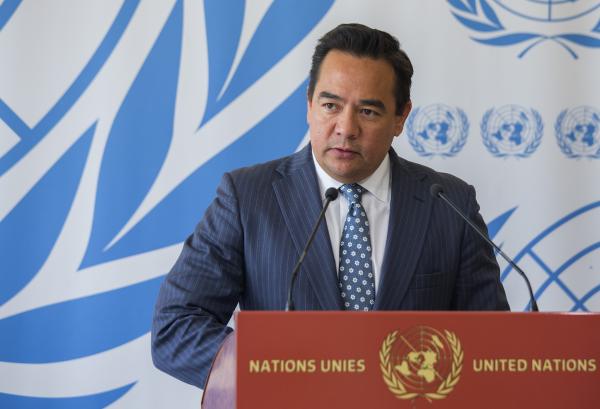

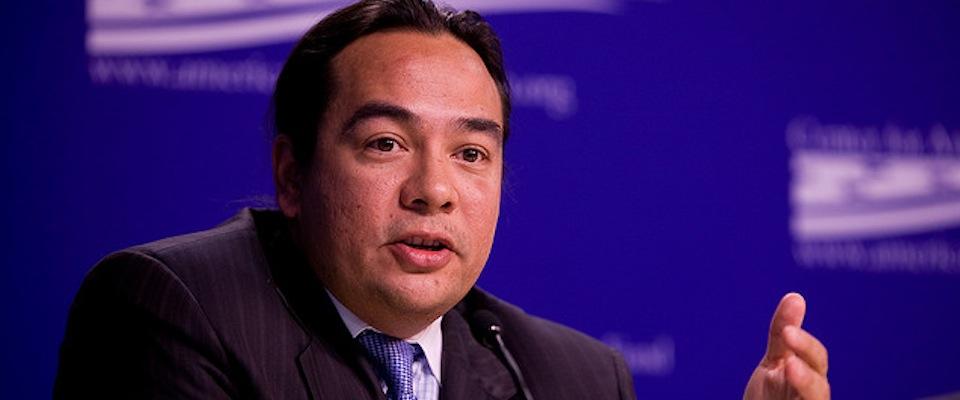 Keith Harper says he always wanted a career that helped his people—indigenous people.
Keith Harper says he always wanted a career that helped his people—indigenous people.
